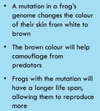Beneficial Mutations & Antibiotics Flashcards
What’s the deal with antibiotic resistance?

Antibiotic resistance happens when germs like bacteria and fungi develop the ability to resist the drugs or antibiotics designed to kill them. This means that germs are not killed and continue to grow.
How do bacteria become resistant to antibiotics anyway?

Bacteria can become resistant either by a genetic mutation or by acquiring resistance from another bacterium. Upon millions of occurrences, a mutation is a one in a million chance. Mutations may enact a biochemical defense against the antibiotics or mutate the bacteria structure to repel against antibiotics..
What is sickle cell anemia and why is it harmful to the human body?

Sickle cell anemia is an inherited red blood cell disorder in which aren’t enough healthy red blood cells to carry oxygen throughout your body. Unlike the healthy blood cell disks that move easily through blood vessels, the sickle cell carrier structure is made in a way that sticks to the blood vessel and clogs the blood flow, inevitably making problems in distributing blood throughout the body’s organs.
Why is sickle cell anemia a trend in malaria-infested areas and how could it be beneficial for inhabitants in those areas?

Sickle cell anemia is a trend in malaria-infested areas because sickle cell anemia is sort of a child-mutation under malaria and becomes a common disorder to inherit from parents but also on the other hand, can give you second-hand immunity from the effects of malaria.
What are some ways we can determine if a mutation is beneficial or not?

- increases an organism’s chance of survival and ability to reproduce
- an increase of chance that the mutation would be inherited by the organism’s offspring
Why are mutations beneficial to an organism?

Mutations are beneficial to an organism because it comes in effect of natural selection.

